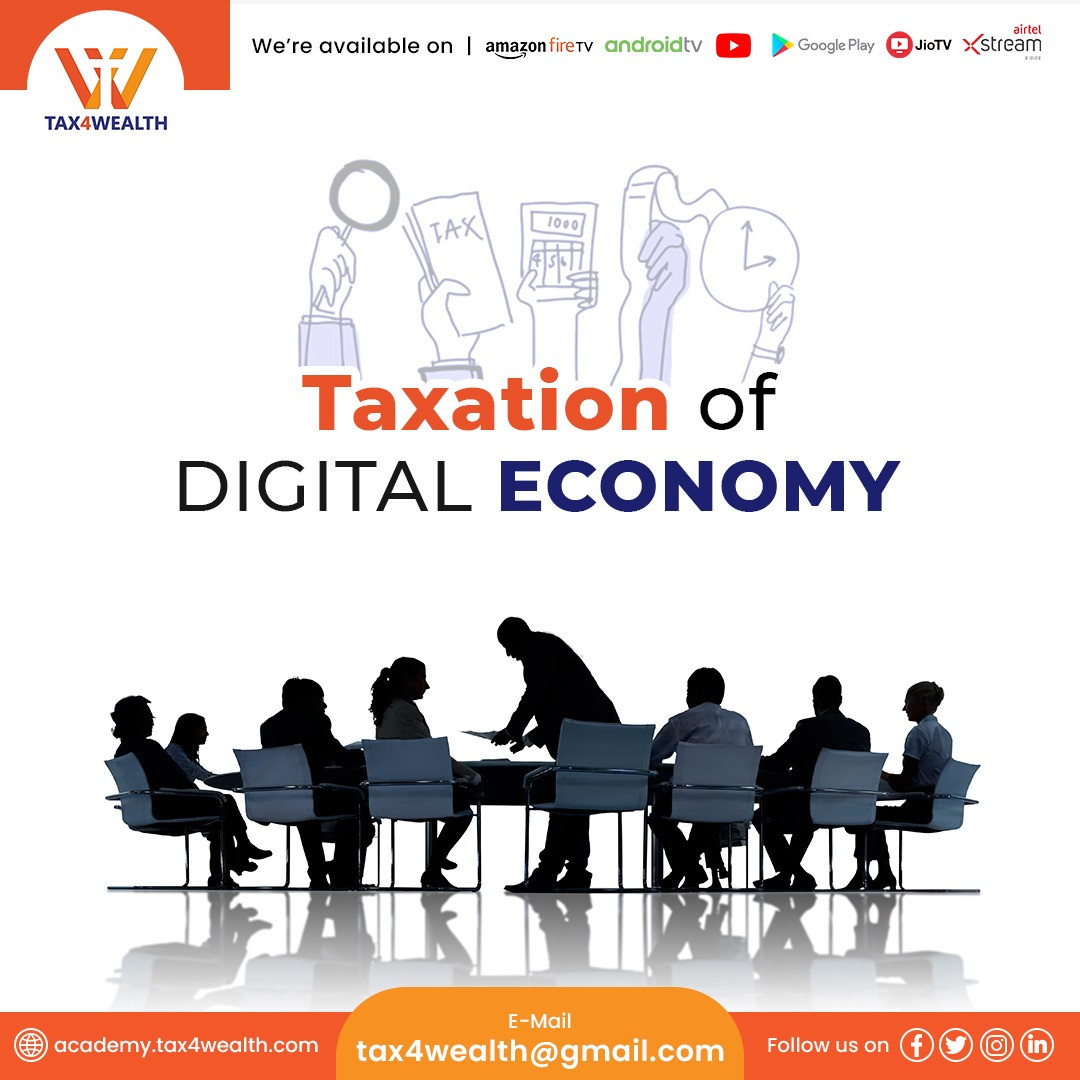
Taxation of Digital Economy- [Updated]
Introduction
A digital economy refers to an economy that is based on digital computing technologies. Although these days there is an increase in the perception regarding the concept of the digital economy while conducting business in the markets based on the world wide web and the internet. In simple words, the digital economy is also known as the web economy or internet economy. To be more specific it is referred to as an economy based on digital technology.
Over the past few years, there has been a sea change in the way of conducting business. This can be better understood with the help of an example. For example, one of the biggest providers of cab services Uber is not the owner of all the cabs that it engaged in the services of the customers. Likewise, there are so many frontiers including Amazon, Paytm, Makemytrip, Flipkart, etc to name a few. All of the aforesaid companies are not engaged in providing conventional business but they contribute a lot to the digital economy and its development.
The existing rules of tax in India as well as internationally were revised a few years ago considering the functions of the brick-and-mortar economy. However, it is undoubtedly evident that the introduction of the digital economy in the current regime of tax is quite redundant. Today, digital businesses are making profits at an alarming rate but there are no commensurate tax laws in respect of the aforesaid profits earned by the businesses. Considering the same, this can be regarded as the need of the hour not only for India but also for all countries across the globe to revamp and revise their respective taxation law as it can be clearly seen that the digital economy is at its peak for the consideration of taxation.
An Overview of Taxation in India
The Direct Tax in India is administered and governed by and under the Income-tax Act, 1961. The residents and non-residents are taxed on their income earned in India and worldwide respectively. There are separate conditions to determine the residential status of the companies. The companies will be treated as a resident during a particular financial year provided they satisfy the following conditions;
- The company is incorporated in India
- The company has a place of business in India
Considering the above-mentioned two conditions, it is clear that if a company is incorporated outside India and does not have a place of business in India, it will be considered a non-resident company for income tax purposes.
The taxation of non-residents is regulated under sections 5 and 9 of the Income Tax Act 1961 and also under the provisions of the Double Taxation Avoidance Agreement. Accordingly, the income generated from the business is regulated under section 9 of the Income Tax Act 1961, where the income is deemed to arise or accrue in India as a result of the business having a place of business in India. Under the provisions of the Double Taxation Avoidance Agreement, The profits of the business are attributed to a Permanent Establishment which is considered a separate and distinct entity under the regulation of Articles 5 and 7 of the Double Taxation Avoidance Agreement.
The business profits can be taxed on the fulfillment of a condition which is that if there is a business connection or permanent establishment in India at a rate of 40%, until and unless the income can be treated as fees or royalty for the technical services provided and the same will be taxed at 10% on the gross amount. Under the provisions of section 90(2) of the Income Tax Act, a non-resident is eligible to claim the advantageous provisions that exist between the Double Taxation Avoidance Agreement and the Income Tax Act, 1961.
Considering the existing rules and regulations and accordingly addressing the concerns of tax in respect of the digital economy the following two issues need to be analyzed;
- Treatment of Income and its Characterization
- Permanent Establishment and Attribution Of Profits
Treatment of Income and its Characterization
There are many differences while we consider the treatment of tax of a particular income based on its characterization. There are three categories under which the income of a non-resident can be categorized namely Fees Royalties and Business Income. The rate of tax for each of the aforesaid incomes completely depends on its characterization. In case a taxpayer has provided an incorrect classification of the income which is not according to the provisions of the international principles then that case the taxpayer may face consequences as a result of double taxation in separate jurisdictions and also ultimately can face litigation prosecution. The aforesaid aspect is generally applied in the case of a non-resident taxpayer. The taxation aspect of a non-resident taxpayer on his income is provided below;
|
Nature of Income |
In case of no Permanent Establishment |
In case of having a Permanent Establishment |
|
Royalty/ FTS |
Taxable at 10% on gross amount or rate of DTAA, whichever is lesser |
Taxable at 40% on the net amount |
|
Business Income |
Not taxed |
|
Further, in the case of Wipro Ltd., the High Court of Karnataka held that the payments made to a non-resident taxpayer to obtain the license for the usage of the database will be regarded as granting the right for access to the database or transferring the right for the usage of copyright. Thus, the income will be taxable under the classification of royalty and will not be trated as business income. There can be several times when the taxation authorities will have different and contradictory opinions on some of the similar payment transactions made to the non-resident taxpayer for access to a database. However, in some cases, the royalty earned can be categorized as business income and will not be treated as royalty.
Similarly, in the case of IMG Media Ltd, the Mumbai Tribunal held that the amount paid to an assessee in respect of delivery and capture of live audio and coverage of visuals in the IPL cricket matches will not be considered as Fees for technical services. It was analyzed that the BCCI has no technical expertise from the assessee which is can help them to provide live coverage of the match on their own at the end of the IPL. Considering the aforesaid aspects the Mumbai Tribunal held that the BCCI is the owner of the program content and as there is no transfer of broadcasting rights, the payments made will not be treated as royalty.
However, it is to be noted that the aforesaid ruling can be applicable on a case-to-case basis. Thus, it is necessary on the part of the judicial authorities to follow an approach that is consistent in nature and according to the principles which are internationally acceptable. This will ultimately will help to create a conducive environment for the taxpayers. Apart from that, there are various others payments related to data retrieval, data warehousing., web hosting, etc. to name a few which are still not discussed in the courts. The reason behind the same maybe there is very minimum guidance and regulation or no regulation to bring this aspect into the ambit of taxation. Thus, it is an essential aspect that must be discussed in respect of the transactions related to technology and that the user of the same may not escape to pay taxes.
Permanent Establishment
The income can be featured based on the nature of the transaction which includes royalty or Fees for technical services. Taxes can be levied basing the rate as prescribed in the above-mentioned table. However, when an income is featured as a business income, then in that case until and unless a Permanent establishment is created in India or there is a business connection in India. The income will not be taxed considering it as a foreign company or non-residnet. The term business connection completely depends and refers to the source of income and the base of the same. The source of income and place for generating the business provides a right to tax the income that arises from the activities carried on in a specific country.
For example, if a foreign company based out of India has been receiving the publishing content and advertisement fees of a taxpayer who is an Indian resident on its search portal. It is worth consideration is that the business model of such companies who are using this type of search engine completely relies on intellectual property rights. Thus, it provides then the advantage to function in any lower tax jurisdiction across the globe. Moreover, the advertising fees received from any such search engine based out of India will not be considered as fees received for technical services, and accordingly, it is not taxable in India as there is no permanent establishment of the aforesaid foreign company in India. Apart from that the foreign company is a tax resident of its home country and is also not liable to pay any tax in any other country in which it has been providing its services. Thus, the establishment of a Permanent Establishment in India or providing an analysis of business connections in India is one the most complex thing specifically when the business model is related to digital technology. However, It completely depends on the tax authorities if they can provide a demonstration that there is a concept called business connection and permanent establishment in India.
Attribution Of Profit
The next aspect that needs to be analyzed is the attribution of profits to the permanent establishment of the non-resident taxpayer. In addition to this, until and unless the current rules of attribution which are globally applicable are amended substantially, there may not be a significant tax structure on income in India. According to Article 7 of the Organization for Economic Co-operation and Development (‘OECD’) Model Tax Convention, When a person maintains books of accounts, then the permanent establishment has to be regarded as a distinct and separate entity, and accordingly, the profits of the business need to be apportioned as per the arm length principle. The profits cannot be determined if separate books of accounts are not being maintained. In that case, the tax authorities may implement Rule 10 of the Income-tax Rules, 1962 and determine the profits in either of the following manners;
- Turnover Percentage
- The proportion of Total Profit
- Another manner as the Assessing Officer thinks appropriate
Considering the above-mentioned issues, unilateral amendments are suggested which should be adopted by both foreign jurisdictions and India. However, there are some limitations and recommendations that can be more useful for the final implementation of the amendments. From the analysis made above, it can be seen that non-resident companies do not have an adequate physical existence in the source country, and thus to tighten the tax structure in India the concept of equalization levy was introduced.
Unilateral Measures and their Evolution
At the time of the G-20 Summit, the countries of G-20 mainly focused on the need for the division of laws related to taxing the business model in respect of digital technology. Today, the business model related to doing digital business is a reality and there has been a consequential change in doing business not only in India but also globally. Accordingly, there has been consequential in the taxation sphere, especially in income tax. Considering the aforesaid facts, the Summit ordered the OECD to find a way to fill the gaps in the taxation system worldwide. Further, OECD published and suggested an action plan named Base Erosion and Profit Shifting (BEPS) In July 2013 containing 15 plans. The final report of the aforesaid action plan was published in the year 2015. In the first place, the BEPS curbed the evasion of taxes and double non-taxation and referred to the same as the strategies of tax avoidance so that it can exploit the gap and mismatch the rules of tax to shift the profits to non-tax jurisdictions artificially.
Out of 15 Action Plans, the first plan containing the challenges that can be posed by the taxation of the digital economy was published. The following are some of the possible options suggested to face the challenges of taxation of the digital economy;
- Equalization Levy
- To Withhold the tax on some of the digital transactions
- Implementation of Nexus-based approach
However, none of the aforesaid suggestions or options was mentioned in the report. Consequently, the OECD made an acknowledgment that until and unless the world sensus provides a view on this issue, the countries across the globe can adopt any of the provided options for implementation of their domestic tax regime. However, the countries must respect the obligations as treaties while adopting any of the aforesaid options. Apart from that, they can also include bilateral tax treaties after their due negotiation. Provided the modification of treaties may take ample time, most countries over the past three to four years have already adopted interim measures in the domestic tax regime to overcome the challenges of tax.
Equalization Levy
India introduced the concept of Equalization Levy under the Finance Act, of 2016 as a part of domestic tax law. The aforesaid levy came into force on 1 June 2016. According to the provisions, when a nonresident or resident taxpayer having a permanent establishment in India pays for a certain service to a non-resident who does not have a permanent establishment in India, and the consideration amount aggregate exceeds 10 Lakhs in a particular financial year, then, in that case, the taxes will be levied at 6% rate on the total amount of consideration.
The term Specified Service has been defined accordingly which includes digital advertisement, online advertisement, and any other service related to online advertising as notified and prescribed by the government. Furthermore, in most cases when a service provider who is a non-resident and does not have a permanent business in India will not agree to the imposition of the new levy, the service receiver, a resident taxpayer may opt of grossing up the consideration considering the additional economic burden. On the other hand, there are also some necessary and relevant amendments in the Finance Act with the stipulation that when the receipt of the service provider is considered for equalization levy, then the receipt of the same will be exempted for the preview of the Act and thus, will not be considered as a part of total taxable income.
Regulation and Compliances
Further, when the recipient of the service fails to get a credit in respect of the levy collected to the government treasury, then in that case the recipient has to pay the simple interest at 1% for such levy each month. In case the recipient of service fails to deduct the equalization levy, then the service recipient will be liable to pay the penalty which may be equal to the amount of equalization levy apart from the original amount of equalization levy. An assessee who is aggravated by the order of penalty imposition by the Assessing Officer can appeal to the Commissioner of Income Tax (Appeals) within 30 days from the date of passing of the order by the Assessing Officer. Apart from that, the assessee can also appeal at the Appellate Tribunal within 60 days from the date of passing of the order by the Commissioner of Income Tax (Appeals).
Nexus based approach
In 2016, after the introduction of the Equalization levy, India became one of the first countries across the globe to introduce the concept called Significant Economic Presence, otherwise known as SEP in its domestic tax regime. Accordingly, the term business connection was defined which is contained in section 9 of the Finance Act. Thus, it brought the income generated by a non-resident taxpayer in the form of SEP under the tax net in India. The Finance Act, 2018, describes the SEP in the following manner;
The transaction made in respect of goods in India are above the provided value which includes digital goods
OR
The transaction made in respect of services in India are above the provided value which includes digital services
OR
The transaction made in respect of any property in India is above the provided value which includes downloading software or data
OR
Continuous and systematic engagement with the provided number of users on digital media platforms
OR
Continuous and systematic socialization of businesses from India with the provided number of users on digital media platforms
It is worth discussing that the specific value can be an aggregate based on the value of a single transaction. The Finance Act further provides that in case of non-existence of the place of business of resident or place of business of non-resident. It will still provide a business connection if comes under the definition of SEP.
For qualifying as SEP, the threshold limits are yet to be decided and notified by the CBDT. The CBDT is also inviting and asking for suggestions from the general public and stakeholders in this regard to prescribing a threshold limit according to the quantum of revenue and the number of users and accordingly the SEP of a non-resident in India can be determined. Further, The OECD even works the get public views on the proposals which are meant to address of tax challenges of the digital economy. Therefore, it is necessary to devise the rules of nexus so that the profits can be allocated to a specific jurisdiction considering the scope of value creation.
No comments yet, Be the first to comment.













